 |

Basic Call to Consciousness

Intention

Invented White
History & Imagery

In the Beginning

First Nations Governance

Trail of Tears

Tragedy of
Little Bighorn

Massacre at
Wounded Knee

Duwamish/Suquamish
Displacement

Cultural Genocide

Native Values

Impact of European Immigrants

The Take-over

Called ‘Indian’ or....

Cultural Genocide - Boarding schools

Native Values &
Way of Life

Morality

Depression &
Substance abuse

Cultural Distinctions

Spiritual Sensibilities

Language

Living Two Lives

Leaders or Rulers

Written or Oral

Painful History

Iroquois Conservation

Chief Seattle’s
Farewell Speech

Spirit Road

|
 |

Morality
Lakota Elder continues: “White people are taught to keep away from things because of ownership, not because of RESPECT. This is why traditional indigenous people had no need for locks, no need for written laws, no jails. There was no stealing, if someone was hungry, they could go in your house and get food. That was all. Why didn’t people take things? Because of respect.

Lakota Elder continues: “We believed in honor. Our guide was inside-not outside. HONOR was our guide. It was more important for us to know what was right than what was wrong.”

In Profiles of Wisdom, Eunice Baumann-Nelson, Penobscott Native and university level educator speaks of values instilled in traditional Native children:

“In the Native way there was a system of disciplining children that involved loving ridicule or gentle teasing when a child misbehaved. Such teasing continued into adult life--you know, gentle teasing when someone is reacting childishly or unthinkingly. The teasing is actually a way of showing love. This type of discipline evokes shame rather than guilt. Having internalized shame, you, yourself, are the judge of your own misdeeds. With guilt it depends on the judgment of others--and, as long as no one else finds out, a person need not experience any remorse. I conjecture that self-judgment constitutes a stronger check on wrongdoing than does the judgment of others.”
|
 Martin Brokenleg, professor of Native American studies at Augustana College in South Dakota, member of the Rosebud Sioux Tribe and practices the culture of the Lakota people. “Native Americans have a very high regard for children," he says. "In the Lakota language, the word for child means ‘standing sacred.’ Children are treated respectfully and there is no punishment. This is in contrast to the Dickensonian approach to child-rearing brought to this country by the English. Adults felt they had to punish children to shape them. Martin Brokenleg, professor of Native American studies at Augustana College in South Dakota, member of the Rosebud Sioux Tribe and practices the culture of the Lakota people. “Native Americans have a very high regard for children," he says. "In the Lakota language, the word for child means ‘standing sacred.’ Children are treated respectfully and there is no punishment. This is in contrast to the Dickensonian approach to child-rearing brought to this country by the English. Adults felt they had to punish children to shape them.
|
Contrasting with dominant culture values, she continues: “So a lot of dominant culture go along leading their lives saying, Well, I won’t do this or that because it’s against the law. But that’s not nearly as strong as having your source of morality within you--arising out of an inner perception of what is wrong or shameful. You are your own judge. Guilt comes from other people knowing that you have done wrong. It doesn’t come from yourself. When it comes from yourself, as with shame, then you find you have more control over your actions.”

Inupiat Alaska Native woman in Messengers of the Wind confirms the Lakota’s statement-she says:
“There was no word in our language for stealing, because since everything was shared, nobody had to steal.”

The Lakota elder continues: “We didn’t measure people by rich or poor. When times were good-everyone was rich. When times were bad-everyone was poor. We measured people by how they shared. Generosity was a way of life.” Partnership social model exemplified.

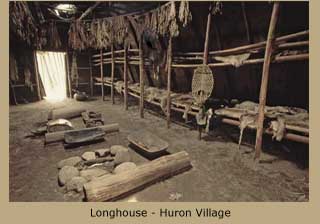 Puyallup tribal woman, Romona Bennett, In Messengers of the Wind confirms: “Everyone knew the rules for social conduct in Native societies. Everybody was useful and part of the future, so there was no need for unemployment insurance or welfare, juvenile detention centers, prisons or nursing homes. Our old people don’t get thrown out like garbage. They have wisdom and can teach the little ones. The Indians had extended families--the finest form of social security there is. White people just discovered co-op housing--different generations living together sharing a huge living area....This promotes a sense of security, mutual protection and emotional support. It cuts down on excessive use of heat, utilities and space and is thus efficient and economical. Our people call that a longhouse.”
Puyallup tribal woman, Romona Bennett, In Messengers of the Wind confirms: “Everyone knew the rules for social conduct in Native societies. Everybody was useful and part of the future, so there was no need for unemployment insurance or welfare, juvenile detention centers, prisons or nursing homes. Our old people don’t get thrown out like garbage. They have wisdom and can teach the little ones. The Indians had extended families--the finest form of social security there is. White people just discovered co-op housing--different generations living together sharing a huge living area....This promotes a sense of security, mutual protection and emotional support. It cuts down on excessive use of heat, utilities and space and is thus efficient and economical. Our people call that a longhouse.”

Lakota elder continues: “We Indians don’t talk to white people much. We never have. There is a reason. White people have never listened to us when we talked. Sometimes they pretended to hear and made promises. Then they broke those promises. There was no more reason to talk....We welcomed you to our land. We gave you food and smoked the sacred pipe with you. We trusted the goodness in your hearts. We tried to share with you. But our trust was not returned. No matter what we gave you, there was always something else you wanted. For the Spanish, it was gold. For the French, it was furs. For the English, it was land. But always there was something. Always you were looking past us at something else. Our people tried to welcome your people-but you destroyed that welcome--with crosses and diseases and whiskey and guns.

“You take over the whole beautiful continent and pave it over with highways and shopping malls”
Depression & Substance abuse
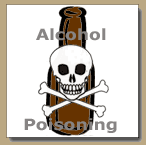
In Night Flying Woman, the story is told: “Oona’s heart broke many times. The game and the wild food with its natural strength were not theirs anymore. These natural foods had been replaced by the salt pork, bacon, and beans. Later the Ojibway succumbed to a Disease of the Spirit. They began to drink the aliens’ liquors, which helped them forget that they were classed as caricatures in a land that once honored them.”

In Messengers of the Wind, White Earth Ojibway woman confirms: “Natives had been used to moving with the seasons in search of wild game, fish and rice, sharing what nature provided each season. There’s a theory that Indian people have never been allowed to go through a grieving period for the world we lost. Our entire way of life--culture, food, spirituality, family! So, this theory goes, the problem is DEPRESSION which often leads to SUBSTANCE ABUSE. Every Indian is touched by that. I have it in my family. Studies show that many hard-core street alcoholics were brought up as traditional Indians. They could not adjust to the loss of land and culture. I think Indian people need to find a way to live in the world as it is, and still remain Indian.”

 John (Fire) Lame Deer, Lakota, 1903-1976, spoke his views on the question of why Indians drink:
“They drink to forget the great days when this land was ours upon which to live and roam--when the land was beautiful, without highways, billboards, fences and factories...and the poverty of the reservations...nothing that would bring honor to make us feel good in this life...”
John (Fire) Lame Deer, Lakota, 1903-1976, spoke his views on the question of why Indians drink:
“They drink to forget the great days when this land was ours upon which to live and roam--when the land was beautiful, without highways, billboards, fences and factories...and the poverty of the reservations...nothing that would bring honor to make us feel good in this life...”

Regarding the Christian crosses: In Messengers of the Wind, Hodenosaunee Native woman speaks: “The churches were looking for souls, land and an economic base. My grandmother remembered that during periods of economic depression, missionaries would entice Indian people into the church with promises of clothing and food--but they'd have to be baptized first. So my grandma’s family was baptized--it was survival. They continued with the Longhouse Religion, and that duality continues today.”
Distinctions between First People & Dominant Culture
Lakota elder continues: “The most important thing for white people is Freedom. The most important thing for Indian people is Honor. The white world puts all the power at the top. When someone gets to the top, they have the power to take your freedom. When your people first came to our land they were trying to get away from those people at the top. But they still thought the same way, and soon there were new people at the top in this new country. It is just the way you were taught to think. In your churches there is someone at the top-in your schools-in your government-in your businesses. There is always someone at the top and that person has the right...they own you. The ancestral social structure of the European immigrants was the feudal system--the feudal lords with all their power and money can be likened, today, as the ‘corporate’ lords -- and the serfs are the dwindling middle class who are trying, desperately, to live the American dream... often with burdensome credit card debt and members of the family so –busy’, they have little time to connect with each other. In olden times families and children were busy toiling in the fields of the feudal lords - today, the parents toil long hours in the corporate office and the children are ‘scheduled’ to keep them ‘busy’. Example of hierarchical dominator model--then and now. No wonder Americans always worry about their freedom.

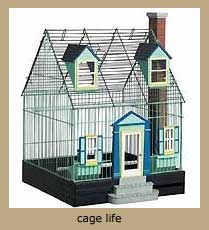
 ”When your people came among us, you couldn’t understand our way. You wanted to find the person at the top. You wanted to know how far our land went....Your world was made of cages--from your square houses to your little square piece of property you own. ”When your people came among us, you couldn’t understand our way. You wanted to find the person at the top. You wanted to know how far our land went....Your world was made of cages--from your square houses to your little square piece of property you own.

 “Even though you hated your cages you believed in them. They defined your world and you needed them to define ours. And, we started noticing-your clothes fit like cages-your houses looked like cages-everything was a cage. You turned the land into cages-little squares. After that, you made a government to protect the cages-all your laws were about what you could NOT do. The only freedom you had was inside your own cage. Then, you wondered why you didn’t feel free. We Indians never thought that way. Everyone was free. We didn’t make cages of laws or land. “Even though you hated your cages you believed in them. They defined your world and you needed them to define ours. And, we started noticing-your clothes fit like cages-your houses looked like cages-everything was a cage. You turned the land into cages-little squares. After that, you made a government to protect the cages-all your laws were about what you could NOT do. The only freedom you had was inside your own cage. Then, you wondered why you didn’t feel free. We Indians never thought that way. Everyone was free. We didn’t make cages of laws or land.

 “We believed in Honor. Our guide was inside-not outside. It was honor. It was more important for us to know what was right than what was wrong. We watched the animals and saw what was right. We saw how the buffalo would stand and watch until we understood. We saw how every animal had wisdom and we tried to learn that wisdom from watching them. We reached for what was right.” “We believed in Honor. Our guide was inside-not outside. It was honor. It was more important for us to know what was right than what was wrong. We watched the animals and saw what was right. We saw how the buffalo would stand and watch until we understood. We saw how every animal had wisdom and we tried to learn that wisdom from watching them. We reached for what was right.”


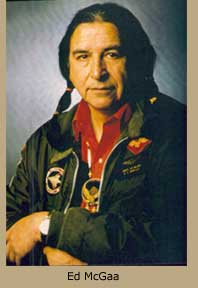 So many accounts of traditional Native people and their code of Honor guiding their actions.
Ed McGaa, Oglala Lakota, author, in his book Native Wisdom, asks: “Why is it that indigenous people were not inclined to do the evil or ignorant acts that the dominant society did when they come to these shores? Why could early explorers and trappers simply leave their belongings in a pile in Indian territory and identify them simply with a marking stick. Only among indigenous people would the possessions of another be left alone and secure. Back in the trappers’ own society, his pile of goods would have been stolen.”
So many accounts of traditional Native people and their code of Honor guiding their actions.
Ed McGaa, Oglala Lakota, author, in his book Native Wisdom, asks: “Why is it that indigenous people were not inclined to do the evil or ignorant acts that the dominant society did when they come to these shores? Why could early explorers and trappers simply leave their belongings in a pile in Indian territory and identify them simply with a marking stick. Only among indigenous people would the possessions of another be left alone and secure. Back in the trappers’ own society, his pile of goods would have been stolen.”

In his book, Nature’s Way: Native Wisdom for Living in Balance with The Earth, he provides inspiring accounts of wisdom gained by observing behaviors of the many animals.

Chikataubut, a Native of the 1620’s was deeply offended when the first white Plymouth settlers thoughtlessly desecrated the grave of his mother, stealing the bear-skins that covered her body. Native people lived without locks and keys and needed no written laws nor jails. Unwritten rules are based on truthfulness and respect. During traditional times one could be put to death for lying. Stringent moral codes were essential for a tribe to work together cohesively in a society living together in close quarters where interdependence, respect and trust were essential for their survival.
Distinction between Spiritual Sensibilities
Lame Deer illustrates a powerful distinction in his book, Seeker of a Vision, between the underpinnings of First Peoples’ spiritual--he references Lakota spiritual practices--sensibilities and those of Christians:

 “The difference between the white man and us is this: You believe in the redeeming powers of suffering--suffering endured by someone else, far away, two thousand years ago. We believe this is up to every one of us to help each other, even through the pain of our own bodies [sacred ceremony of the Sun dance]. Pain, to us, is not abstract, but very real. We do not lay this burden onto our god, nor do we want to miss being face-to-face with the spirit power--when we are fasting on the lone hilltop, or tearing our flesh at the sun dance, then we experience...closest to the mind of the Great Spirit. Insight does not come cheaply; we want no angel or saint to gain it for us--giving it to us secondhand.“ “The difference between the white man and us is this: You believe in the redeeming powers of suffering--suffering endured by someone else, far away, two thousand years ago. We believe this is up to every one of us to help each other, even through the pain of our own bodies [sacred ceremony of the Sun dance]. Pain, to us, is not abstract, but very real. We do not lay this burden onto our god, nor do we want to miss being face-to-face with the spirit power--when we are fasting on the lone hilltop, or tearing our flesh at the sun dance, then we experience...closest to the mind of the Great Spirit. Insight does not come cheaply; we want no angel or saint to gain it for us--giving it to us secondhand.“
Distinction between Languages
In Profiles in Wisdom, Penobscot educator speaks about the contrast between the English language and languages of First People: “As I went on studying, I began to recognize that the whole structure of dominant society and especially the structure of the English language, completely dichotomizes the world with its either/or propositions. There’s almost no allowance for paradoxes. Something has to be either animate or inanimate, natural or supernatural, and so forth. Our language shapes our way of understanding the world, and this is the way we see it...with paradox, with rich textures and depth.”

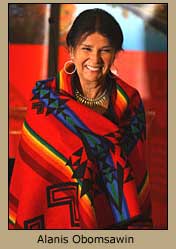 Alanis Obomsawin, born 1932, a Canadian filmmaker of Abenaki descent and raised primarily in Quebec, has produced and directed many documentaries on First Nations culture and history. Her best known documentary is Kanehsatake: 270 Years of Resistance
Alanis Obomsawin, born 1932, a Canadian filmmaker of Abenaki descent and raised primarily in Quebec, has produced and directed many documentaries on First Nations culture and history. Her best known documentary is Kanehsatake: 270 Years of Resistance

She states: “In our language there is no word to say inferior or superiority or equality because we are equal; it’s a known fact. But life has become very complicated since the newcomers came here. And how does your spirit react to it? It’s painful. You have to be strong to walk through the storm. I know I’m a bridge between two worlds. All I ask is for people to wash their feet before they try to walk on me. For native people who speak their language, English can be very confusing. Many times you cannot express in English the true meaning of Indian words. When we hear something in English we sometimes react or our spirit reacts. Sometimes we need to use English words out of order to express our true meanings. We need to be patient and pray. Living in two worlds can be difficult. Life is painful sometimes. The pain of life is where the lessons are learned. ’

Lakota elder continues with Nerburn: “In our language, what was important to our people was saying something the best way. In English you learned to say things a hundred different ways. I never heard anything like it!

 “I'm going to tell you some of those ways of saying things that hurt because of the way people say them: The first is about the battles. When white people won it was a victory. Whenever we, First People, won, it was a massacre. What’s the difference? There were bodies on the ground and children lost their parents, whether the bodies were Indian or white. But the whites use their language to make their killings good and our killings bad. Whites won and Indians massacred. Whites also massacred--such as at Wounded Knee--but I have hardly ever heard anyone ever talk about that white massacres, where children and their mothers, and elderly women and men were massacred by white soldiers on horseback as they tried to run away on foot through the winter snow. I don’t like it when people use that word only about the killing we did. It makes our killing seem uglier than yours, so it makes our people seem worse than your people. “I'm going to tell you some of those ways of saying things that hurt because of the way people say them: The first is about the battles. When white people won it was a victory. Whenever we, First People, won, it was a massacre. What’s the difference? There were bodies on the ground and children lost their parents, whether the bodies were Indian or white. But the whites use their language to make their killings good and our killings bad. Whites won and Indians massacred. Whites also massacred--such as at Wounded Knee--but I have hardly ever heard anyone ever talk about that white massacres, where children and their mothers, and elderly women and men were massacred by white soldiers on horseback as they tried to run away on foot through the winter snow. I don’t like it when people use that word only about the killing we did. It makes our killing seem uglier than yours, so it makes our people seem worse than your people.

 “Another word: uprising-your people use that word to talk about anytime our people couldn’t stand what was happening to them anymore and tried to get our rights. But you don’t call your Revolutionary War an uprising. Why not? There was the British government taking freedom away from you and you stood up against it. You called that a Revolution. When we did it, it was called an uprising, like, everything was peaceful and orderly until we rose up. I’d like it if the history books said: Then the Indians were kept down again rather than, Then the Indians rose up again. It would be more truthful. “Another word: uprising-your people use that word to talk about anytime our people couldn’t stand what was happening to them anymore and tried to get our rights. But you don’t call your Revolutionary War an uprising. Why not? There was the British government taking freedom away from you and you stood up against it. You called that a Revolution. When we did it, it was called an uprising, like, everything was peaceful and orderly until we rose up. I’d like it if the history books said: Then the Indians were kept down again rather than, Then the Indians rose up again. It would be more truthful.

 “What about the word warpath? When you came out against us, you formed an army. When we came out to defend our families we went on the warpath. I won’t even talk about words like blood-thirsty and savage. “What about the word warpath? When you came out against us, you formed an army. When we came out to defend our families we went on the warpath. I won’t even talk about words like blood-thirsty and savage.

 “We didn’t understand that your people had to name everything to make it exist, and the name you gave something made it what it was. You named where we lived the so-called wilderness, so that made it a wild and dangerous place. Without even knowing it, you made us who we are in your minds by the words you used. You are still doing that, and you don’t even know it’s happening. The ideas in your words are wrong. They are giving our children and your children the world in a wrong way. “We didn’t understand that your people had to name everything to make it exist, and the name you gave something made it what it was. You named where we lived the so-called wilderness, so that made it a wild and dangerous place. Without even knowing it, you made us who we are in your minds by the words you used. You are still doing that, and you don’t even know it’s happening. The ideas in your words are wrong. They are giving our children and your children the world in a wrong way.

 “There was an old man who told me when I was a boy that I should look at words like beautiful stones. “There was an old man who told me when I was a boy that I should look at words like beautiful stones.  He said I should lift each one and look at it from all sides before I use it. Then I would respect it. White people have so many words that you don’t respect them. There is always another one, so you just throw them out there without thinking. I think you need to be more careful. Words are like stones, if you throw them out without thinking, they can hurt someone. He said I should lift each one and look at it from all sides before I use it. Then I would respect it. White people have so many words that you don’t respect them. There is always another one, so you just throw them out there without thinking. I think you need to be more careful. Words are like stones, if you throw them out without thinking, they can hurt someone.

 “My little great grandson came home from school and told me they were studying about the frontier in American history. I asked him about what he was learning about the frontier. He told me it was where Civilization Stopped. I almost told him he couldn’t go back to that school anymore! They’re teaching him that civilization only existed up to where the white men had reached! That means that everything on the other side of that line was Uncivilized! Well, we were on the other side of that line! We had governments and laws, too. Our people were better behaved than the people who came into our lands. We thought we were at least as civilized as the white man. But here is my little great grandson coming home from school being taught about the frontier and civilization like we, his people, didn’t exist! It’s still like this, today! “My little great grandson came home from school and told me they were studying about the frontier in American history. I asked him about what he was learning about the frontier. He told me it was where Civilization Stopped. I almost told him he couldn’t go back to that school anymore! They’re teaching him that civilization only existed up to where the white men had reached! That means that everything on the other side of that line was Uncivilized! Well, we were on the other side of that line! We had governments and laws, too. Our people were better behaved than the people who came into our lands. We thought we were at least as civilized as the white man. But here is my little great grandson coming home from school being taught about the frontier and civilization like we, his people, didn’t exist! It’s still like this, today!

 “It’s like there were wildcats and poisonous snakes and Indians, and they're all the same-[as the image of Manifest Destiny depicts]--just something unknown that made the land dangerous. Your people teach about the frontier. You talk about the wilderness and how empty the land was, even though, to us, the land was always full. “It’s like there were wildcats and poisonous snakes and Indians, and they're all the same-[as the image of Manifest Destiny depicts]--just something unknown that made the land dangerous. Your people teach about the frontier. You talk about the wilderness and how empty the land was, even though, to us, the land was always full.

 “You talk about civilization like we didn’t have any! Just because we didn’t try to haul big chairs and wooden chests across the Plains in a cart! “You talk about civilization like we didn’t have any! Just because we didn’t try to haul big chairs and wooden chests across the Plains in a cart!

 “Your people build your history on words like frontier and civilization, and those words are just your ideas put into little shapes that you can use in sentences. For us First People, this was a big land where people lived everywhere. When the white people came they all wanted something from us-furs, land, gold. They either took it or made us sell it to them. They all had guns. They killed us if we didn’t believe that God was some man named Jesus who had lived in a desert across the sea. They wouldn’t leave us alone. “Your people build your history on words like frontier and civilization, and those words are just your ideas put into little shapes that you can use in sentences. For us First People, this was a big land where people lived everywhere. When the white people came they all wanted something from us-furs, land, gold. They either took it or made us sell it to them. They all had guns. They killed us if we didn’t believe that God was some man named Jesus who had lived in a desert across the sea. They wouldn’t leave us alone.

Lakota elder continues: “Those white people who were drunk with their own vision of the truth and couldn’t see ours.”
Click on the rug to return to the top of the page.

 Home Home
 Quiz Quiz
 About Author About Author

|
![]() ©2015 Lilthea Designs
©2015 Lilthea Designs